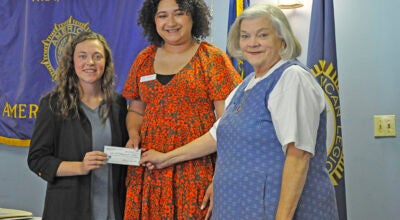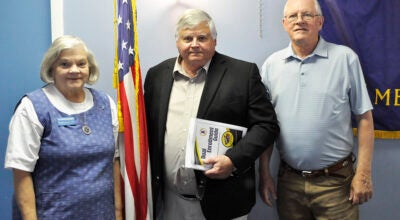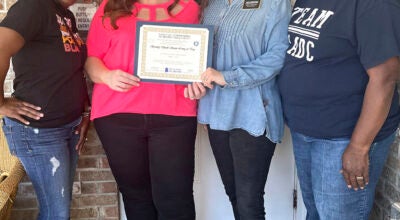Giving thanks
Published 10:00 pm Wednesday, November 26, 2008
For Ariel Harris, being thankful is easy. “For the earth, family, friends, my teacher and my cousins,” said the second-grader at Goshen Elementary School when asked the standard “what are you thankful for?” question. Her classmates were just as quick to respond: “My family, my
cousins and my clothes,” said Destine Rhodes. “Troy University’s football team,” added Tony Fuller. Those simple responses would warm the heart of Brother Bo Weed at Southside Baptist Church who, like many clergy, worries that Americans today are not as thankful as we should be.
“I don’t think it’s hard to be thankful,” he said. “I just don’t know if we’ve gotten so caught in our circumstances that we don’t do it.”
From a church standpoint, he said, “we understand we’re supposed to be thankful, but I’m not sure we’re practicing that.”
With a rising unemployment rate, a $700 billion economic bailout for banks and financial institutions, and looming threats of demise for America’s leading automakers, the economy seems foremost on everyone’s minds this Thanksgiving. Economic uncertainty, war, political change, everyday worries – all these and more tend to capitalize on our collective consciousness.
“We tend to focus on the bad,” Weed said. “… But I wish we could focus on the good.
‘If you focus on helping others or on being helpful, your problems may not go away … but you may realize your problems are not as big as you thought they were.”
Weed’s approach to refocusing is a simple one. On Wednesday, he shared his plan for the congregation at his church. “I’m going to encourage every one of us to find four of five people in the sanctuary who have blessed us in some way and tell that person ‘thank you,’” he said.
That, he added, is what he believes God expects of Christians.
“God wants us to love Him first and to be thankful for what he has given us,” Weed said. “But I believe God wants us to take that a step further. God wants us to love him first and then love other people.”
After all, he added, the greatest commandment issued by God is to “love your God with all your heart.” And the second greatest is “to love your neighbor as yourself.”
“I think that means being thankful to others – husbands, wives, grandmothers, friends,” Weed said.
Getting to that level of thankfulness isn’t always easy. In addition to the distractions of a society based on wants rather than needs, Americans have developed a culture “in which we have taught ourselves ‘I deserve this’ and why should we be thankful for something we deserve?” Weed said.
Not everyone has the perspective tha Weed has gained from his international mission trips to places such as Honduras, where he has worked for families living in deplorable conditions.
There, he said, visitors quickly realize “you’ve got so much to be thankful for, but we take it for granted … People every day don’t have what you and I have,” he said.
So Weed’s message is a simple one: take time today, and every day, to be thankful, to God first and to fellow man second.
And, perhaps, take a tip from the youngest among us, like the first-grades in Alithia Gunter’s class at Banks Primary School who overwhelmingly were thankful for their parents.
“My mom and dad. I am thankful for my sisters and my dogs,” said Beau Quebec.
“For my mom and my pet,” said Alexis Adkins.
“My family and my cats and my dog and cows … and nanna and my paw,” said Anna Price.
These simple reflections should be the goal of adults as well as children, Weed said.
“I hope that happens … I pray that will happen.”





